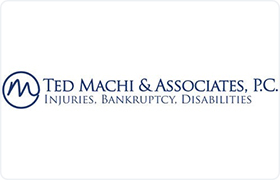Coppell Bankruptcy & Debt Lawyer, Texas
Sponsored Law Firm
-
 x
x

Click For More Info:
-
Machi & Associates, P.C.
1521 North Cooper Street Suite 550 Arlington, TX 76011» view mapAccident & Injury, Bankruptcy, Social Secuirty We Fight So You Don't Have To
Our professional team of attorneys and staff provide the experience and expertise needed to effectively handle your case.
800-804-0771
Andrew A. Dunlap
Civil Rights, International Tax, Bankruptcy, Insurance, Family Law
Originally from Denver Colorado, Andrew Dunlap moved to Kansas City and attended Northwest Jr. High and Wyandotte High School. After graduating, he we... (more)
Kathy E. Roux
Estate Planning, Elder Law, Family Law, Consumer Bankruptcy, Estate
Status: In Good Standing Licensed: 31 Years
James Alfred Pranske
Litigation, Employee Rights, Consumer Bankruptcy, Personal Injury
Status: In Good Standing Licensed: 36 Years
James Alfred Pranske
Litigation, Employee Rights, Consumer Bankruptcy, Personal Injury
Status: In Good Standing Licensed: 36 Years
Faith L. Anderson
Business & Trade, Business, Credit & Debt, Bankruptcy & Debt
Status: In Good Standing Licensed: 37 Years
Glenn Arthur Portman
Commercial Real Estate, Oil & Gas, Banking & Finance, Bankruptcy
Status: In Good Standing Licensed: 49 Years
Renee Toole Kingsley
Science, Technology & Internet, Employment, Business & Trade, Consumer Bankruptcy
Status: In Good Standing Licensed: 33 Years
David Kohm
Bankruptcy, Divorce, Personal Injury, Social Security -- Disability, Mass Torts
Status: In Good Standing
FREE CONSULTATION
CONTACTD. Paul Dalton
International Other, Health Care Other, Employee Rights, Credit & Debt
Status: In Good Standing Licensed: 45 Years
Sherin Thawer
Credit & Debt, Personal Injury, Employee Rights, Family Law
Status: Inactive Licensed: 28 Years
 Ted Machi Arlington, TX
Ted Machi Arlington, TX Practice AreasExpertise
Practice AreasExpertise

